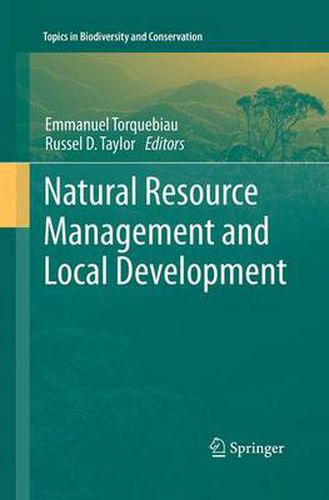Readings Newsletter
Become a Readings Member to make your shopping experience even easier.
Sign in or sign up for free!
You’re not far away from qualifying for FREE standard shipping within Australia
You’ve qualified for FREE standard shipping within Australia
The cart is loading…






This title is printed to order. This book may have been self-published. If so, we cannot guarantee the quality of the content. In the main most books will have gone through the editing process however some may not. We therefore suggest that you be aware of this before ordering this book. If in doubt check either the author or publisher’s details as we are unable to accept any returns unless they are faulty. Please contact us if you have any questions.
Natural resource management by rural citizens in tropical regions is crucial both to the conservation of biodiversity and ecosystem processes, but also to the the well-being and food security of the people that live there. This situation is especially acute in Africa where conflicts between habitat destruction and utilization can arise in areas which are important not only for biodiversity but for the long-term maintenance of ecosystems on which the people ultimately rely. There can also be conflicts between outside specialists and the indigenous knowledge of local communities. A holistic approach involving local peoples in management of their natural resources is therefore essential. A range of approaches to the problem is explored here in relation to natural resource management to local development and livelihoods, and the multi-functional nature of land-use. Major topics debated are the dichotomy between strictly protected areas and ones including human activity, people-centred rather than legally enforced conservation, market forces, and the interrelationships between agriculture and conservation. The book has 12 chapters, prepared by researchers actively involved in community aspects of natural resource management in Africa, and is based on an international workshop held in Niamey, Niger, in 2008. It will be of interest to all involved in the community approach to biodiversity conservation in less developed countries generally and not only in Africa as many of the issues addressed are pertinent globally.
Reprinted from Biodiversity and Conservation 18: 10 (2009).
$9.00 standard shipping within Australia
FREE standard shipping within Australia for orders over $100.00
Express & International shipping calculated at checkout
This title is printed to order. This book may have been self-published. If so, we cannot guarantee the quality of the content. In the main most books will have gone through the editing process however some may not. We therefore suggest that you be aware of this before ordering this book. If in doubt check either the author or publisher’s details as we are unable to accept any returns unless they are faulty. Please contact us if you have any questions.
Natural resource management by rural citizens in tropical regions is crucial both to the conservation of biodiversity and ecosystem processes, but also to the the well-being and food security of the people that live there. This situation is especially acute in Africa where conflicts between habitat destruction and utilization can arise in areas which are important not only for biodiversity but for the long-term maintenance of ecosystems on which the people ultimately rely. There can also be conflicts between outside specialists and the indigenous knowledge of local communities. A holistic approach involving local peoples in management of their natural resources is therefore essential. A range of approaches to the problem is explored here in relation to natural resource management to local development and livelihoods, and the multi-functional nature of land-use. Major topics debated are the dichotomy between strictly protected areas and ones including human activity, people-centred rather than legally enforced conservation, market forces, and the interrelationships between agriculture and conservation. The book has 12 chapters, prepared by researchers actively involved in community aspects of natural resource management in Africa, and is based on an international workshop held in Niamey, Niger, in 2008. It will be of interest to all involved in the community approach to biodiversity conservation in less developed countries generally and not only in Africa as many of the issues addressed are pertinent globally.
Reprinted from Biodiversity and Conservation 18: 10 (2009).